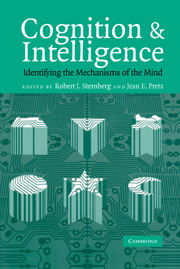Book contents
- Frontmatter
- Contents
- Preface
- 1 Information Processing and Intelligence: Where We Are and Where We Are Going
- 2 Mental Chronometry and the Unification of Differential Psychology
- 3 Reductionism versus Charting: Ways of Examining the Role of Lower-Order Cognitive Processes in Intelligence
- 4 Basic Information Processing and the Psychophysiology of Intelligence
- 5 The Neural Bases of Intelligence: A Perspective Based on Functional Neuroimaging
- 6 The Role of Working Memory in Higher-Level Cognition: Domain-Specific versus Domain-General Perspectives
- 7 Higher-Order Cognition and Intelligence
- 8 Ability Determinants of Individual Differences in Skilled Performance
- 9 Complex Problem Solving and Intelligence: Empirical Relation and Causal Direction
- 10 Intelligence as Smart Heuristics
- 11 The Role of Transferable Knowledge in Intelligence
- 12 Reasoning Abilities
- 13 Measuring Human Intelligence with Artificial Intelligence: Adaptive Item Generation
- 14 Marrying Intelligence and Cognition: A Developmental View
- 15 From Description to Explanation in Cognitive Aging
- 16 Unifying the Field: Cognition and Intelligence
- Author Index
- Subject Index
- References
6 - The Role of Working Memory in Higher-Level Cognition: Domain-Specific versus Domain-General Perspectives
Published online by Cambridge University Press: 23 November 2009
- Frontmatter
- Contents
- Preface
- 1 Information Processing and Intelligence: Where We Are and Where We Are Going
- 2 Mental Chronometry and the Unification of Differential Psychology
- 3 Reductionism versus Charting: Ways of Examining the Role of Lower-Order Cognitive Processes in Intelligence
- 4 Basic Information Processing and the Psychophysiology of Intelligence
- 5 The Neural Bases of Intelligence: A Perspective Based on Functional Neuroimaging
- 6 The Role of Working Memory in Higher-Level Cognition: Domain-Specific versus Domain-General Perspectives
- 7 Higher-Order Cognition and Intelligence
- 8 Ability Determinants of Individual Differences in Skilled Performance
- 9 Complex Problem Solving and Intelligence: Empirical Relation and Causal Direction
- 10 Intelligence as Smart Heuristics
- 11 The Role of Transferable Knowledge in Intelligence
- 12 Reasoning Abilities
- 13 Measuring Human Intelligence with Artificial Intelligence: Adaptive Item Generation
- 14 Marrying Intelligence and Cognition: A Developmental View
- 15 From Description to Explanation in Cognitive Aging
- 16 Unifying the Field: Cognition and Intelligence
- Author Index
- Subject Index
- References
Summary
INTRODUCTION
The idea that short-term memory is an important component of intelligence is not new. For example, over a century ago, James (1890) wrote, “All the intellectual value for us of a state of mind depends on our after memory of it. Only then is it combined in a system and knowingly made to contribute to a result. Only then does it count for us.” Around the same time, Binet (1905) included a test of short-term memory in a test battery designed to identify learning disabled children in the Paris school system. And more recently, short-term memory has been conceptualized as a fundamental component of human cognition. For example, Miller (1956) famously proposed that the capacity of short-term memory is limited to 7 ± 2 bits of information. Later, Atkinson and Shiffrin (1968) incorporated this idea of a central bottleneck in information processing into their “modal” model of memory.
Nevertheless, the extent to which short-term memory plays an important role in higher-level cognition — intelligence manifested in complex cognitive activities like reasoning and learning — has been a topic of considerable debate in cognitive psychology. Consider, for example, the results of a series of experiments by Baddeley and Hitch (1974). The surprising finding in these experiments was that a secondary task designed to tax short-term memory had little or no effect on a variety of reasoning, comprehension, and memory primary tasks.
Information
- Type
- Chapter
- Information
- Cognition and IntelligenceIdentifying the Mechanisms of the Mind, pp. 104 - 121Publisher: Cambridge University PressPrint publication year: 2004
References
Accessibility standard: Unknown
- 4
- Cited by
